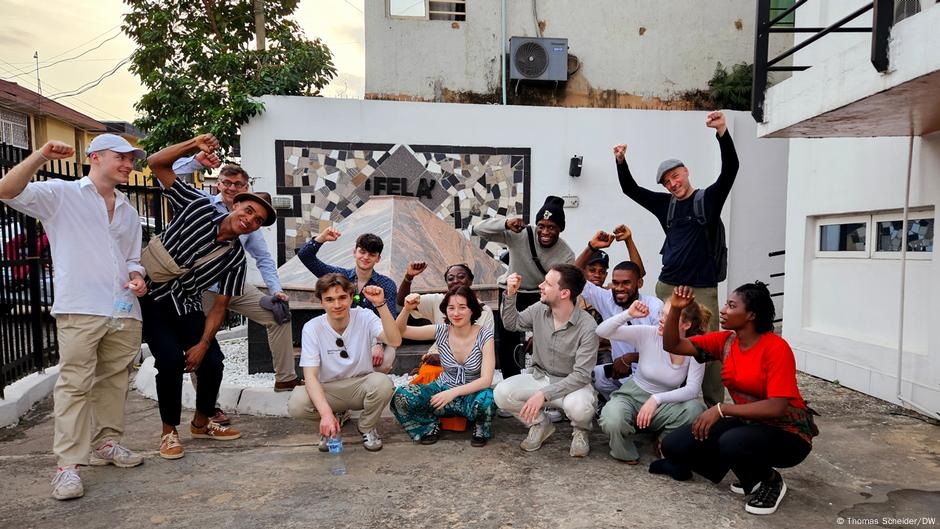Afrobeat meets Beethoven: The Campus Project 2025

When young musicians from Nigeria and Germany took the stage at a Beethovenfest concert in Bonn on September 11, it was clear that the audience was witnessing the culmination of an incredible journey. Afrobeat rhythms pulsed alongside clarinets and violins, Nigerian protest songs blended with Beethoven's "Egmont."
The concert, with its musical mix of diverse influences, was the culmination of the Campus Project 2025, a collaboration between the Beethovenfest Bonn, the German Youth Orchestra, and DW that has existed for more than two decades. Each year, the project brings young musicians together for a cultural and musical exchange.
This year, six young German and six Nigerian musicians met to experiment and network under the direction of the Afrobeat collective BANTU.

The group first met in March 2025 in Lagos, Nigeria. For many of the German participants, it was their first trip to Africa. "It was a fantastic opportunity to learn new things and meet people from other cultures," 20-year-old German clarinetist Luis McCall told DW during the trip.
McCall met Mary Ifeoluwa from Lagos, who studied at the prestigious Muson Centre, one of the best classical music schools on the African continent. Like many others, she began with church music and later studied classical violin.
"We love music in our family, but it's not allowed to pursue it as a profession," Ifeoluwa told DW at the start of the project. "I held on to my music, but it wasn't easy."
The twelve young musicians joined the members of the band BANTU for an intensive week, beginning with rehearsals of the music collective's fiery Afrobeat protest song "Ten Times Backwards." They studied Beethoven and began experimenting with Cassie Kinoshi's score, which was still unfinished at the time.

The trip to Lagos wasn't just about practicing—the group also explored the legacy of one of Nigeria's most famous musicians, widely considered the father of Afrobeat: Fela Kuti. They visited Kuti's New Afrika Shrine nightclub, which he founded in 1972. Over the years, stars like Stevie Wonder and Bono of U2 have performed there—but more importantly, it's where the roots of Afrobeat lie.
Kuti was celebrated worldwide in the 1970s for his vibrant sound, which combined jazz, pop, and the Ghanaian music genre of highlife—and was always politically influenced. Engaging with Kuti's music helped the project find deeper roots and placed it in the context of a tradition in Nigeria, where music has always had the power to inspire and provoke.

The group met again in Bonn in September, just in time for the Beethovenfest. After sightseeing and numerous rehearsals, they gave their final concert during the festival on September 11.
Beethoven's "Egmont" Overture was brought into dialogue with Fela Kuti's "Colonial Mentality," the Afrobeat pioneer's critique of postcolonial thought. Works by Bantu provided a contemporary touch, and German and Nigerian folk songs were reinterpreted by trombonist Isaiah Odeyale. The ensemble also performed Mauricio Kagel's "10 Marches to Miss the Victory," a piece that underscores themes such as pacifism and artistic freedom. The full concert can be viewed here on DW Classical Music .
The evening was particularly moving for British-Nigerian composer Cassie Kinoshi, whose work "odò (river)" was premiered. Kinoshi's father was born in Nigeria and moved to the UK, where she was born. For Kinoshi, the commission was an opportunity to explore her African roots: Her piece for chamber ensemble features the "talking drum" from West Africa, a versatile percussion instrument capable of imitating human speech.
The project also provided an opportunity for reflection for singer-songwriter Adé Bantu. Bantu's father is Nigerian, his mother German. Born in England, he has lived in both Germany, where he began his career, and Nigeria.
"We can call several places home at once. I'm simply someone who feels very much at home in Nigeria and Germany—and I don't feel the need to compare the two countries," Bantu explained.
One last stop in the capitalThe tour continued on September 12, with the musicians traveling to Berlin and performing their program at the Humboldt Forum. There, the group was confronted with another layer of their history : the museum's controversial collection of Benin bronzes. In 2022, Germany returned ownership of the bronzes to Nigeria.
Some artifacts were returned, while others remain on display, now officially on loan from Nigeria to the Berlin Museum. For bandleader Adé Bantu, the return had a personal significance: "It touches me deeply that these works now belong to us Nigerians again."
As for the Campus Project 2025, many agree it was a success. Musicians came together as strangers and, as one participant put it, parted "as a family."
German clarinetist Luis McCall described his impressions as follows: "My worldview has broadened. I've learned a lot about the country, the people, and the political conflicts. And this relaxed approach to making music—just getting started. I'll take this approach to music with me."
Adapted from English: Katharina Abel
dw





